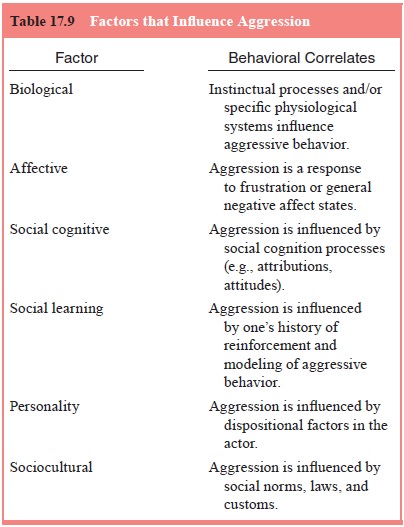Chapter: Essentials of Psychiatry: Social Psychology
Social Psychology: Interpersonal Processes: Aggressive Behavior
Aggressive Behavior
Multiple definitions of aggression have been
proposed by social scientists (Baron and Richardson, 1994). This reflects both
the diverging views regarding the nature and determinants of ag-gressive
behavior and the social norms that provide a context for evaluating whether or
not an aggressive behavior is socially sanc-tioned. For this discussion,
aggressive action is defined as any verbal or physical behavior or set of
behaviors emitted with the intention to harm or damage someone or something.
Biological, affective, social cognitive, social learning, personality and
socio-cultural influences on aggressive behavior are reviewed here in the table
(Table 17.9).
Aggressive behavior has implications both for
overall public health and individual health. For instance, aggression as it
relates to interpersonal violence has obvious public health im-plications. One
clear example of this is family violence, which threatens the physical health
and lives of those toward whom this behavior is directed. At the individual
level, anger and hostil-ity, which play some role in aggression (though are
distinct from aggressive behavior), have been associated with specific health
effects. The most well-known example is research showing in-creased risk of
subsequent coronary heart disease in individu-als with high levels of anger and
hostility (Salovey et al., 1998;
Contrada et al., 1999). Hypothesized
mechanisms for these health effects include psychophysiological processes
(e.g., blood

pressure, stress hormone secretion, heart rate),
health-compro-mising lifestyle patterns (e.g., poor self-care, cigarette
smoking, limited exercise), and reactions to illness (e.g., compromises in
adherence to medical treatment).
Multiple clinical techniques have been developed
for helping individuals effectively modulate and manage aggres-sion. These
include exploring interpersonal patterns in which aggression arises, teaching
cognitive restructuring techniques to address attribution processes (e.g.,
hostile attribution bias) that make aggressive behavior more likely to occur,
employ-ing family therapy approaches (e.g., functional family therapy;
Alexander et al., 1990) and parent
management training, and utilizing cognitive–behavioral therapy techniques
(e.g., problem-solving skills training, social skills training and
aggression-re-lated reinforcement contingencies). These techniques may be used
individually or in combination, depending upon the clini-cal indications
derived from a multidimensional assessment of factors contributing to
aggressive behavior. Where indicated, addressing the role of psychoactive
substance use in aggressive behavior is also important, given research
suggesting that use of substances such as alcohol can be an antecedent to
aggression (Baron and Richardson, 1994)
Related Topics